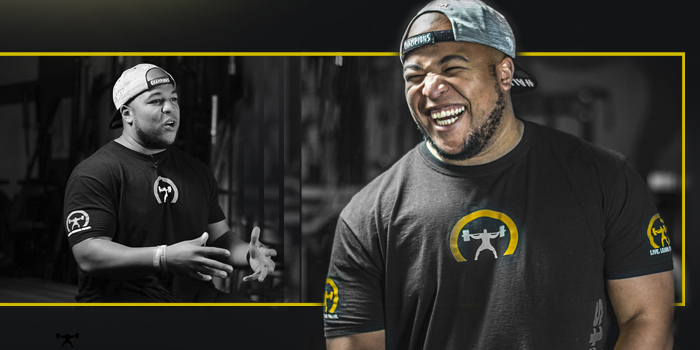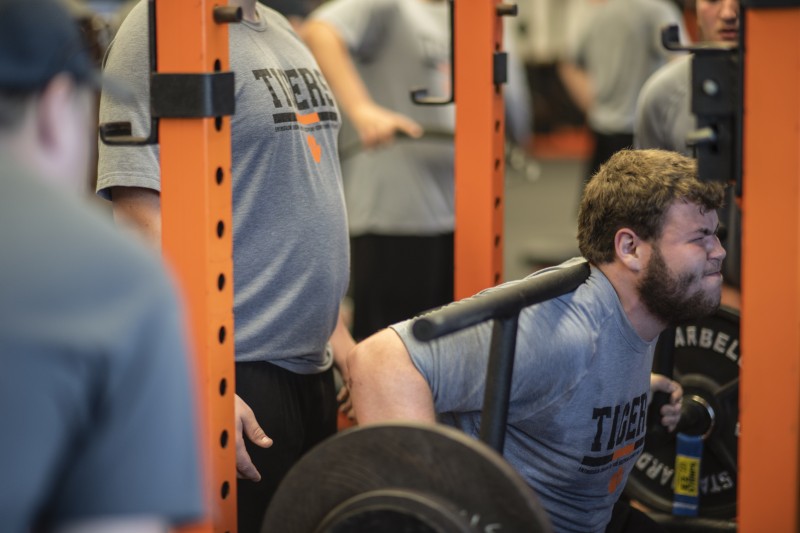
It’s about that time of year: the freshmen are coming. It’s always around the beginning of May that every strength coach in the country plans what they will do with their freshmen program. There’s so much to do with so little time. Most of the time your freshmen class only has five or six weeks to train during the summer. So how do you find a way to efficiently and effectively accomplish your many goals in such a small amount of time?
Let’s start with common goals most all of us want. I’d say we all are worried about teaching these freshmen what college football is and helping them transition from high school to college. Obviously there is going to be a lot of stuff from a physical development standpoint that we all want, such as increased strength (through a multitude of ranges of motion), muscular hypertrophy, work capacity, and power output. While physical preparation is important, mental preparation is just as if not more important. Building work capacity is very important (especially early on for big boys who are out of shape), but building the mental capacity to work needs to be established first and foremost. Building a fortified chest is great, but it means nothing without a fortified mind.
RECENT: Strength Coach Ego Check: Rediscover Who You Are
Let me expand on this. Everyone knows the stereotypical freshman that has all the talent in the world physically but mentally can’t even make it through conditioning — the guy that can run for days when it’s convenient for him but folds when the pressure is on. Now, this isn’t an article about mental toughness, but it is part of what we include in summer training. Teaching guys to push beyond their comfort zone is key in your programming. So the functional training may sound good on paper, but smart, planned volume is a culture-setter with freshmen. Why? For one, they probably do not have good technique, so more reps means more practice at better technique. Another reason is accountability. Volume is tough. It is hard and it is not comfortable. Guys will want to skip reps, but this is where you as a strength coach teach them to be accountable for every single rep and to give attention to detail. Achieving perfect technique for multiple reps over multiple sets requires laser focus and strict attention to detail. I am not saying that a heavy one-rep max doesn’t require the same thing, but a one-rep max isn’t something very advisable early in training for freshmen, for two reasons. First, you don’t know how their technique is. Second, you probably don’t have accurate safe numbers on them within the first six weeks.
To expunge on accurate numbers for freshmen, most of the time we really don’t even have a real estimate of what a freshman is capable of until our first evaluation. And even then we may be off by 20 or 30 pounds (either too light or too heavy). When it comes to a freshman’s actual max numbers, it’s a guessing game. The best we can do prior to evaluations is go based on feel (coach’s eye) and the numbers we see during training. So my question is this: if we can’t fully trust the numbers to generate the correct stimulus for muscular growth and strength, what can we trust? Time under tension! And what better way of maximizing not only all three phases of a muscular contraction to the best of our ability while working technique and developing proper motor patterns than implementing some basics principles of Triphasic Training?
Now, I am not Coach Dietz and I don’t know triphasic inside and out, but what I do know is that most freshmen have no clue how to control the bar on a bench press or build tension in a squat. I also know that at most places I’ve been, we have eye-balled weights and picked arbitrary numbers to start off with — and these numbers stay arbitrary for far too long. So, if we cannot fully capitalize on the weight that is being used, why don’t we capitalize on the time under tension and teaching your athlete how to correctly control a bar through all the muscle contractions while increasing motor unit recruitment, which will also lead to increased strength? This was a light bulb moment for me personally.
WATCH: From Collegiate Defensive Lineman to NFL Fullback — Brian Saunders Transforms Roosevelt Nix
As with anything, taking what one person does and trying to implement it “by the book” is probably not advisable. Whenever you are taking something from someone else, you have to look at what they do and what makes the most sense for your situation. Using triphasic training as an example: I am not Cal Dietz. I understand the general concept so I will work with what I understand. For the freshmen I also won’t be doing 120% eccentrics because we won’t even know what 100% is for them. It’s the time under tension and not the intensity that we will take advantage of. We also won't have every movement under tempo. The main movements that will be programmed “triphasically” will be the bench and the squat. This is not to say that a pull-up or a goblet squat won’t be on-tempo as well, but the blocks will be as follows (with probably minor changes by the time this article is published):
- Week 1 — Concentric and Teaching
- Week 2 — Eccentric
- Week 3 — Eccentric
- Week 4 — Isometric
- Week 5 — Isometric
- Week 6 — Concentric and Evaluation
As I said, I realize Coach Dietz probably uses much higher percentages than what we will be using. But we don’t have percentages to base numbers on, so programming will encompass what we feel is the best and safest alternative, while accomplishing the goals that we want to achieve. Those goals are something that I believe we all want as a strength community with our freshmen. The program design has smart, planned volume, which will lead to increases in muscular hypertrophy, while at the same time increasing work capacity due to the amount of work being done under the tempos at which it will be performed. It’ll slow down the main movements for guys that may or may not know how to correctly do the movements. It’ll also help our freshmen gain size due to the hypertrophic effect of time under tension. Discipline will be accomplished by holding our freshmen responsible for every rep and making sure they stay on the desired tempos we set. Also of importance is having the attention to detail of making sure they do the prescribed amount of reps, all while pushing them out of their comfort zone to accomplish the goals we want for them. Check, check, check, and check.
This is just my rationale for what will be the basis of the freshmen programming. Am I saying it’s the only way? No. Is it the only thing I’ve ever done? No. Is it even close to my "Westside", "tier system", "wave percentages" method? No. But it’s what I believe will be the best thing for the overall development of these freshmen in the parameters set forth to give them the best chance of physical and mental preparation for camp, while also setting them up for their future training sessions. At the end of the day, that’s what we all want: to set our freshmen up for success for the future. How we go about it isn’t about ego and “our system” or anything like that. It’s about taking the time to put thought into what you’re doing and what will be the best for them. And what may be best for them may be getting outside of your bubble and researching different ideas. You’re a strength coach, which encompasses a lot of things, including being a get-it-done guy. So figure out your parameters and get it done!











